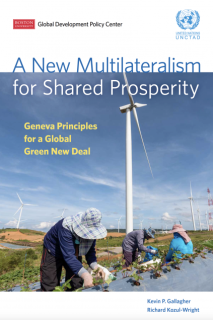
In A New Multilateralism for Shared Prosperity: Geneva Principles for a Global Green New Deal, UNCTAD’s Richard Kozul-Wright and the University of Boston’s Kevin Gallagher spell out five key steps that need to be taken to solve the system of “predatory rent-seeking” or “crocodile capitalism” they believe has broken the social contract established in the wake of World War II, allowing global corporations to benefit while the general public loses.
Crafted in a series of workshops and consultations in late 2018 and early 2019, between the conveners and stakeholders from the global policy, advocacy, and research communities, the Geneva Principles for a Global Green New Deal advances a critique of the current multilateral system and articulates a set of goals and principles for its reform and regeneration.
The goal is to lay the foundations for a new multilateralism that rebuilds the rules of the global economy towards goals of coordinated stability, shared prosperity and environmental sustainability, while respecting national policy sovereignty.
5 goals for rebalancing development:
A productive global economy built around full and decent employment at livable wages, for all countries;
A just society that targets closing socio-economic gaps, within and across generations, nations, households, race and gender;
A caring community that protects vulnerable populations and promotes economic rights;
A participatory politics that defeats policy capture by narrow interest groups and extends the democratic principle to economic decision making;
A sustainable future based on the mobilization of resources and policies to decarbonize growth and recover environmental health in all its dimensions.
5 principles for a new multilateralism:
Global rules should be calibrated towards the overarching goals of social and economic stability, shared prosperity and environmental sustainability, and be protected against capture by the most powerful players;
States should share common but differentiated responsibilities in a multilateral system built to advance global public goods and protect the global commons;
The right of states to policy space to pursue national development strategies should be enshrined in global rules;
Global regulations should be designed both to strengthen a dynamic international division of labour and to prevent destructive unilateral economic actions that prevent other nations from realizing common goals;
- Global public institutions must be accountable to their full membership, open to a diversity of viewpoints, cognisant of new voices, and have balanced dispute resolution systems.
